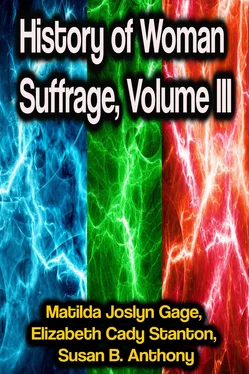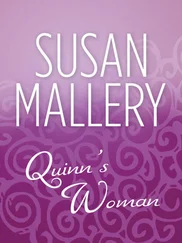The above petition was presented January 24, and the following bill introduced February 5:
An Act to relieve the political disabilities of Matilda Joslyn Gage :
Be it enacted by the Senate and House of Representatives of the United States of America in congress assembled, that all political disabilities heretofore existing in reference to Matilda Joslyn Gage, of Fayetteville, Onondaga county, State of New York, be removed and she be declared a citizen of the United States, clothed with all the political rights and powers of citizenship, namely: the right to vote and to hold office to the same extent and in the same degree that male citizens enjoy these rights. This act to take effect immediately.
The following year a large number of similar petitions were sent from different parts of the country, the National Association distributing printed forms to its members in the various States. The power of congress to thus enfranchise women upon their individual petitions is as undoubted as the power to grant individual amnesty, to remove the political disabilities of men disfranchised for crime against United States laws, or to clothe foreigners, honorably discharged from the army, with the ballot.
The first convention[20] after the all-engrossing events of the centennial celebration assembled in Lincoln Hall, Washington, January 16, with a good array of speakers, Mrs. Stanton presiding. After an inspiring song by the Hutchinsons and reports from the various States, Sara Andrews Spencer, chairman of the congressional committee, gave some encouraging facts in regard to the large number of petitions being presented to congress daily, and read many interesting letters from those who had been active in their circulation. Over 10,000 were presented during this last session of the forty-fourth congress. At the special request of the chairman, Senator Morton of Indiana, they were referred to the Committee on Privileges and Elections; heretofore they had always been placed in the hands of the Judiciary Committee in both Senate and House. A list of committees[21] was reported by Mrs. Gage which was adopted. Mrs. Swisshelm of Pennsylvania, was introduced. She said:
In 1846 she inherited an estate from her parents, and then she learned the injustice of the husband holding the wife's property. In 1848, however, she got a law passed giving equal rights to both men and women, and everybody decried her for the injury she had done to all homes by thus throwing the apple of discord into families. So in Pennsylvania women now hold property absolutely, and can sell without the consent of the husband. But actually no woman is free. As in the days of slavery the master owned the services, not the body of his slaves, so it is with the wife. The husband owns the services and all that can be earned by his wife. It is quite possible, as things now stand, to legislate a woman out of her home, and yet she cooks, and bakes, and works, and saves, but it all belongs to the man, and if she dies the second wife gets it all, for she always manages him. The extravagance of dress is due alone to-day to the fact that from what woman saves in her own expenses and those of her house she gets no benefit at all, nor do her children, for it goes to the second wife, who, perhaps, turns the children out of doors.
The resolutions called out a prolonged discussion, especially the one on compulsory education, and that finally passed with a few dissenting voices:
Whereas one-half of the citizens of the republic being disfranchised are everywhere subjects of legislative caprice, and may be anywhere robbed of their most sacred rights; therefore,
Resolved , That it is the duty of the Congress of the United States to submit a proposition for a sixteenth amendment to the national constitution prohibiting the several States from disfranchising citizens on account of sex.
Whereas a monarchial government lives only through the ignorance of the masses, and a republican government can live only through the intelligence of the people; therefore,
Resolved , That it is the duty of Congress to submit to the State legislatures propositions to so amend the Constitution of the United States as to make education compulsory, and to make intelligence a qualification for citizenship and suffrage in the United States; said amendments to take effect January 1, 1880, when all citizens of legal age, without distinction of sex, who can read and write the English language, may be admitted to citizenship.
Whereas a century of experience has proven that the safety and stability of free institutions and the protection of all United States citizens in the exercise of their inalienable rights and the proper expression of the will of the whole people, are not guaranteed by the present form of the Constitution of the United States; therefore,
Resolved , That it is the duty of the several States to call a national convention to revise the Constitution of the United States, which, notwithstanding its fifteen amendments, does not establish justice, insure domestic tranquility, promote the general welfare, nor secure the blessings of liberty to us and to our posterity.
Resolved , That the thanks of the women of this nation are due to the Rev. Isaac M. See, of the Presbytery of Newark, for his noble stand in behalf of woman's right to preach.
Resolved , That the action of the Presbytery of Newark in condemning the Rev. I. M. See for his liberal course is an indication of the tyranny of the clergy over the consciences of women, and a determination to fetter the spirit of freedom.
Among the many letters to the convention we give the following:
Boston, 16th January, 1877.
Dear Friend: These lines will not reach you in time to be of use. I am sorry. But absence and cares must apologize for me. I think you are on the right track—the best method to agitate the question; and I am with you. I mean always to help everywhere and every one.
Wendell Phillips.
Miss Anthony.
Manchester, Eng., January 3, 1877.
My Dear Miss Anthony: It is with great pleasure that I write a word of sympathy and encouragement, on the occasion of your Ninth Annual Convention of the National Woman Suffrage Association.
Beyond wishing you a successful gathering, I will say nothing about the movement in the United States. Women of either country can do nothing directly in promoting the movement in the other; and if they attempt to do so, there is danger that they may hinder and embarrass those who are bearing the burden and heat of the day. The only way in which mutual help can be given is through the women of each nation working to gain ground in their own country. Then, every step so gained, every actual advance of the boundaries of civil and political rights for women is a gain, not only to the country which has secured it, but to the cause of human freedom all over the world.
This year marks the decennial of the movement in the United Kingdom. In the current number of our journal, there is a sketch of the political history of the movement here, which I commend to the attention of your convention, and which I need not repeat. The record will be seen to be one of great and rapid advance in the political rights of women, but there has been an equally marked change in other directions; women's interests in education, and women's questions generally, are treated now with much more respectful consideration than they were ten years ago. We are gratified in believing that much of this consideration is due to the attention roused by our energetic and persistent demand for the suffrage, and in believing that infinitely greater benefits of the same kind will accrue when women shall be in possession of the franchise. Beyond the material gains in legislation, we find a general improvement in the tone of feeling and thought toward women—an approach, indeed, to the sentiment recently expressed by Victor Hugo, that as man was the problem of the eighteenth century, woman is the problem of the nineteenth century. May our efforts to solve this problem lead to a happy issue.
Читать дальше












